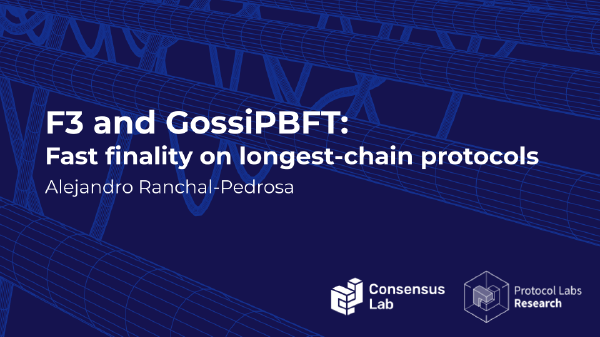The AbstractionLab houses several independent research projects directly exploring the future of decentralization and how infrastructure affects technological possibilities.
ConsensusLab explores cutting-edge scalable permissionless consensus protocols, including three main pillars of sharding, consensus proper, and scalable execution.
CryptoComputeLab is focused on the intersection of applied cryptography, high performance computing, and programming language design. We strive to create and consume practical research to develop deployed software
CryptoEconLab at PL aspires to become a hub for research on economic incentives, coordination games, and novel marketplaces. We aim to develop capacity to design, validate, deploy, and govern large-scale economic systems.
Cryptonet is a public good cryptography lab providing technological empowerment by creating secure building blocks for Web3 protocols.
Network Research explores new mechanisms for incentivizing and supporting public goods creation in the areas of science and technology.
ProbeLab is on a mission to measure the performance of Web3 network protocols, benchmark protocols against target performance milestones, and propose improvements to their core design principles.
Research Acceleration seeks to enable faster progress through the design and operation of effective and efficient support and funding mechanisms.
The mission of the Resilient Networks Lab is to build resilient distributed systems, by creating and operating a platform where researchers can collaborate openly and asynchronously on deep technical work.
Category theory (CT) originated as a subdiscipline of pure mathematics, with a historical strength in unifying disparate mathematical areas to transport proofs and constructions between them. CT can also be viewed as an upgraded foundation for all of math, taking the place traditionally occupied by first-order logic and set theory, and is commonly used in theoretical computer science (especially type theory), and as a foundation for computational theorem-proving.
In any forum or marketplace where people can interact, the venue itself guides and constrains human interaction. Cryptoeconomics provides practices, tools, and knowledge that allow us to engineer the venue to achieve a goal.
Modern cryptography plays an integral role in every aspect of online and electronic security, including providing evidence you’re speaking to the intended party and hindering spying on the subsequent communication. Cutting-edge cryptography tools will allow the creation of incredibly strong evidence that general information processing has been performed in a privacy-preserving and trustless way.
Our electricity system is undergoing a monumental transition from a centralized design based on fossil fuels to a distributed architecture based on renewable energy. Successfully navigating this requires reconceiving the grid as a distributed system, able to coordinate diverse resources and influence the deployment of capital by setting up appropriate incentive structures.
Distributed systems are, broadly speaking, networked systems whose components are located in different nodes that communicate and coordinate to achieve the system’s purpose. Distributed systems are at the very core of what we do and our interests extend across the entire field.
We aim to use learnings from previous efforts, growth in available data, and ambitions of qualitatively novel capabilities to facilitate the discovery, linking, and processing of knowledge. This work primarily consists of support for The Underlay, a project intending to build a global, distributed graph of public knowledge.
Metaresearch is the investigation of how scientific innovation occurs. It encompases work in the history, philosophy, and economics of science; the effects of incentive systems in research; the evaluation and validation of scientific data; and the dissemination of scientific knowledge, among other fields.
Computer networks enable information to move across the globe. They are foundational to the world we live in and to the vast majority of our work. Our interests include transport and routing protocols, network security, p2p systems, publish-subscribe protocols, and network monitoring and simulation.
A long-term goal for the IPFS ecosystem is to merge distributed apps and local apps into a single paradigm: fundamentally rethinking the UNIX programming model for a content-addressable platform. As a component of this, we aspire to make the best use of state-of-the-art advances in programming language design and implementation, such as substructural types, modal types, and algebraic effects.
 F3 and GossipBFT: Fast finality on longest-chain protocols
F3 and GossipBFT: Fast finality on longest-chain protocols